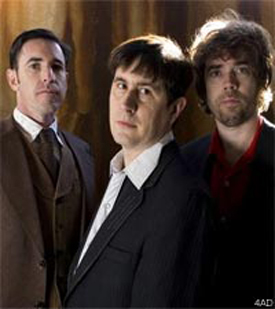
The Mountain Goats, now a trio, named the tracks on their new album after biblical verses.
The Mountain Goats usually succeed when songwriter and frontman John Darnielle just tells a good, straightforward story. But on the band’s latest album, The Life of the World to Come, the music doesn’t match the quality of the lyrics.
Darnielle, the driving force behind the trio that also features Peter Hughes and Jon Wurster, rarely grapples with broad, vague concepts in his lyrics. For instance, in “Best Ever Death Metal Band in Denton” from 2002’s All Hail West Texas, he tells a strikingly literal story about, well, the best ever death metal band in Denton. He has also created characters that appear in assorted songs, such as the Alpha Couple, whose relationship gradually deteriorates.
So at first glance, it may seem strange that every song on The Mountain Goats’ new album is named after a biblical verse.
It soon becomes clear, however, that the titles serve more as influences than as guidelines for the songs. The album doesn’t have a heavy religious slant, and Darnielle’s stories are still all there, even if they are a tiny bit more vague than his earlier material.
And these tales are probably just as interesting as any in the past — Darnielle has always been a gifted lyricist — but it’s kind of hard to tell for sure, considering the music complementing them is so mediocre.
On previous works, Darnielle got away with simplicity: Many of his songs on albums up until All Hail West Texas were acoustic songs he recorded onto a boom box. Because of the lo-fi nature of the recordings and the minimal presence of instrumental variety, focus was cast upon Darnielle’s wiry voice and intelligent lyrics.
And that was fine. All parties involved knew what to concentrate on, and The Mountain Goats grew in popularity. Over time, though, Darnielle decided to move into recording studios and add piano, strings and other instruments to his songs.
In 2008 he released the solid, though at times uneven, Heretic Pride. Some songs benefited from the added instruments (“Sax Rohmer #1,” “Lovecraft in Brooklyn”), but others felt emotionally manipulative and were way too blunt with their string work (“San Bernardino”). Despite Heretic Pride‘s faults, Darnielle still made the listener feel something, regardless if it was a sincere emotion.
But on The Life of the World to Come, the music rarely offers anything emotional. Too often the songs fall flat, relying on Darnielle to save them with his lyrics and vocals. Unfortunately, he fails to do so.
In the past, this wouldn’t be a problem. But because he has plenty of studio resources and because he has proved to be a capable songwriter beyond the bounds of just an acoustic guitar, the songs shouldn’t seem this underdeveloped.
A lot of this comes into play when Darnielle gets behind the piano, such as on “Genesis 30:3.” The tempo is considerably slower than many of his songs, and the repetitive chord progression keeps it from going anywhere. The exact same problem comes up on “1 John 4:16,” where even wavering strings in the background can’t ward off the inevitable boredom.
Similarly, “Matthew 25:21” goes for nearly six tiresome minutes without changing its strum pattern or adding more instruments.
The only jolt in an otherwise sleepy album is “Psalms 40:2,” where Darnielle shows off exactly how powerful his voice can become when highlighting the intensity of a song.
On The Life of the World to Come, Darnielle favors subtlety over intensity. But he doesn’t have the ability — musically or vocally — to carry a full album through such a minimalist landscape.
There are a few moments where he gets it right — the beautiful “Hebrews 11:40” comes to mind — but overall there’s just not enough to keep the listener enticed. Darnielle doesn’t need to become a slave to fast tempos and vocal emoting, but before he commits to such quiet he needs to make sure it’ll be a compelling listen.
jwolper@umd.edu
RATING: 2.5 out of 5 stars



